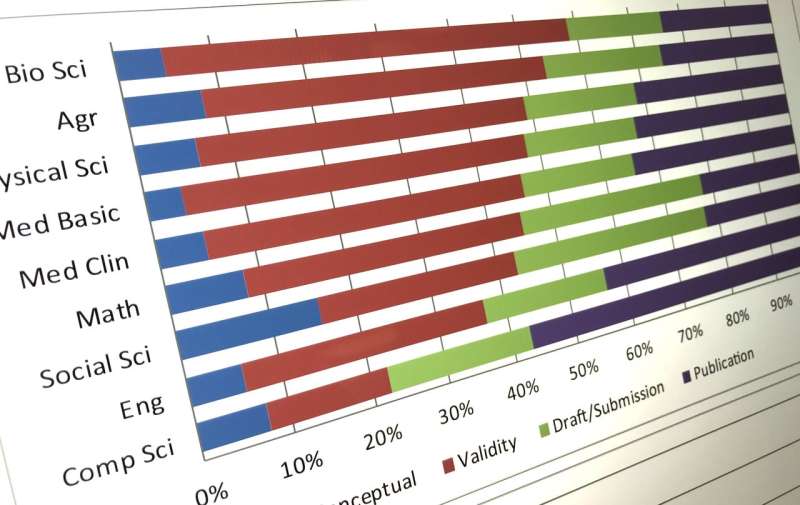May 17, 2018 report
Study of prepublication disclosure shows some do and some don't

A quartet of researchers affiliated with Harvard University, the University of Passau in Germany and the University of Missouri, has found that a majority of researchers disclose details about their research prior to publication. In their paper published on the open access site Science Advances, the researchers describe what their survey of a large number of scientists revealed.
The decision to reveal important details about work before publication, the researchers found, involves a lot of factors—likely more than could be summed up in a single paper. But, they further note, it can be categorized. They came to this conclusion by surveying 7103 faculty researchers located in the U.S., Switzerland and Germany, spanning nine fields.
The researchers found that approximately 67.2 percent of researchers had disclosed details of their work prior to publication. They also found that they could group them into three main categories: norms, level of competitiveness and commercialization possibilities. The first category defies reason—people reveal details of their work before publishing because others before them have done so and it has become the norm. The other two categories are quite logical in contrast. A scientist is not going to reveal details about his or her work if they fear being scooped, or if a patent is at stake.
The most common reason scientists cited for sharing their work before publication was a desire for feedback. Also, the researchers found that mathematicians and social scientists are more likely to share before publishing on average. Engineers, computer scientists and those working in medical schools, on the other hand, were less likely to share. They also found a tendency among those working on formulaic problems to share their work in hopes of drawing attention to something similar to what they were working on.
Still unclear, the researchers acknowledge, is the issue of impact, or more specifically, whether it really matters to science. Would we be getting better or worse results if those who do not share started doing so, or vice-versa? They suggest the answer might be tied to the peer review process, which is currently the norm in the publishing world. Is it possible that scientists get better feedback from visitors to preprint sites than they do from colleagues affiliated with major journals? The answer is still unknown.
More information: Prepublication disclosure of scientific results: Norms, competition, and commercial orientation, Science Advances 16 May 2018: Vol. 4, no. 5, eaar2133, DOI: 10.1126/sciadv.aar2133
Abstract
On the basis of a survey of 7103 active faculty researchers in nine fields, we examine the extent to which scientists disclose prepublication results, and when they do, why? Except in two fields, more scientists disclose results before publication than not, but there is significant variation in their reasons to disclose, in the frequency of such disclosure, and in withholding crucial results when making public presentations. They disclose results for feedback and credit and to attract collaborators. Particularly in formulaic fields, scientists disclose to attract new researchers to the field independent of collaboration and to deter others from working on their exact problem. A probability model shows that 70% of field variation in disclosure is related to differences in respondent beliefs about norms, competition, and commercialization. Our results suggest new research directions—for example, do the problems addressed or the methods of scientific production themselves shape norms and competition? Are the levels we observe optimal or simply path-dependent? What is the interplay of norms, competition, and commercialization in disclosure and the progress of science?
Journal information: Science Advances
© 2018 Phys.org




















